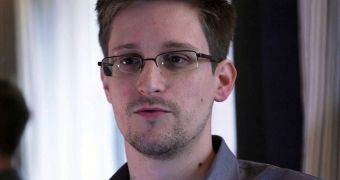Yesterday, Edward Snowden took a stand once more and questioned the Russian president on whether his country practiced mass surveillance or not.
During an annual event where Vladimir Putin answers various questions from the media, Snowden had a video intervention and addressed questions on the topic that interested him the most – surveillance.
“Does Russia intercept, store or analyse, in any way, the communications of millions of individuals? And do you believe that simply increasing the effectiveness of intelligence or law enforcement investigations can justify placing societies, rather than subjects, under surveillance?” he asked.
Putin, a man who used to work as a spy for the Soviet KGB, identified Snowden as a “former agent” and chose to respond to him in “professional language.”
“Our intelligence efforts are strictly regulated by our law, so how special forces can use this kind of special equipment to intercept phone calls or follow someone online, and you have to get court permission to stalk a particular person,” Putin said during the intervention. “We don’t have a mass system of such interception and – according with our law – it cannot exist,” he added.
And while the country does have the possibility to fight back against criminals and terrorists through surveillance, the country does not have as much money as the United States or the technical devices.
All in all, this was a pretty weak statement from Putin; one that echoes some denials made by US President Barack Obama when the entire scandal broke out last year.
Alas, all this has gone unnoticed, along with the courage it took Snowden to challenge yet another world leader on live TV. Instead, those who have been criticizing him so far for overlooking the fact that he is currently living in Russia, a country famous for its intelligence system, are now slamming him for questioning Putin. There’s no pleasing these people.
“I expected that some would object to my participation in an annual forum that is largely comprised of softball questions to a leader unaccustomed to being challenged. But to me, the rare opportunity to lift a taboo on discussion of state surveillance before an audience that primarily views state media outweighed that risk. Moreover, I hoped that Putin's answer – whatever it was – would provide opportunities for serious journalists and civil society to push the discussion further,” Snowden explains in a piece he wrote for The Guardian.
This being said, Snowden has once more lit the spark for more discussion on the topic of mass surveillance, but this time it’s happening in Russia. Whether the media will have the courage to push the issue or will go on like nothing has happened and like Putin didn’t just avoid answering most of Snowden’s question remains to be seen.
“I blew the whistle on the NSA's surveillance practices not because I believed that the United States was uniquely at fault, but because I believe that mass surveillance of innocents – the construction of enormous, state-run surveillance time machines that can turn back the clock on the most intimate details of our lives – is a threat to all people, everywhere, no matter who runs them,” Snowden writes.
That being said, through his writing, Snowden hints that he doesn’t really believe what Putin said. After all, Obama and the NSA have also said countless times that everything happens within the confines of the law and leaked documents have proved the exact opposite.

 14 DAY TRIAL //
14 DAY TRIAL //